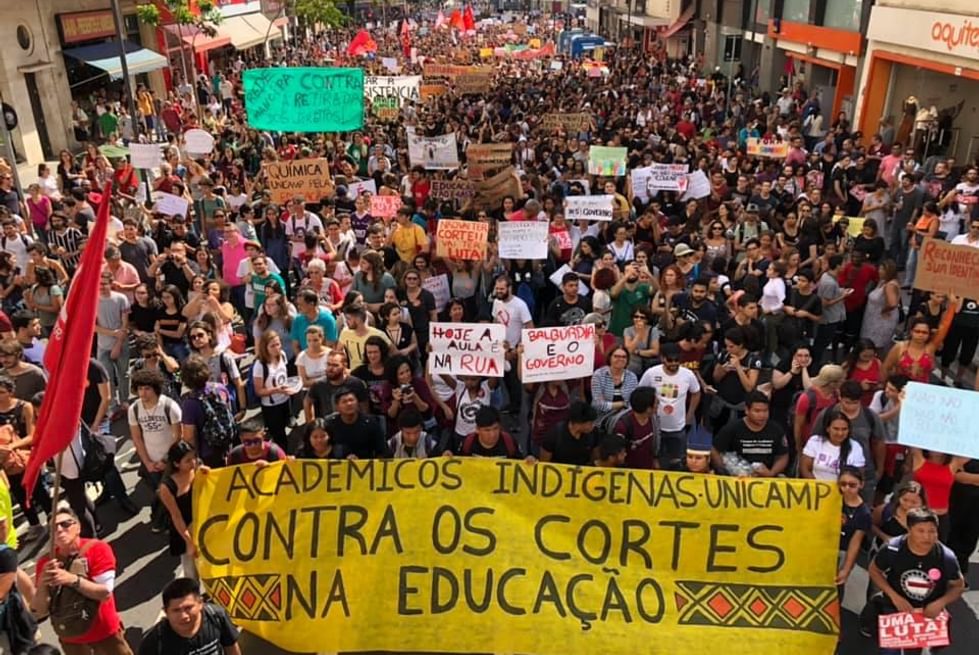
Recently Brazil became an example of the destructive forces of populist extreme-right-wing governments. Indigenous and traditional populations, the environment, the few welfare state services (such as public health care and the higher education system) became obstacles for the reactionary agenda proposed by Jair Bolsonaro’s government. With the motto that “the institutions are working properly” other democratic powers such as the legislative branch and the judiciary granted a state of normalcy for what was clearly exceptional and anti-democratic, given the frequency with which Jair Bolsonaro runs over the Brazilian Constitution. In this context, many of the once hidden conservative groups that exist in the country felt entitled to make their stance through discourse and action. For some intellectuals, this showed the fallacy of the once praised cordiality of Brazilian people. For others, particularly those who have been historically subject to state’s structural violence, this was all too familiar. With this in mind, we asked a group of social scientists to elaborate on this political figure that is so hard to grasp. From his post-truth strategies to the forms of resisting his actions, the authors gathered here carefully analyze the consequences of Bolsonaro’s government as well as what can be already seen as something that may survive his own term as a political trope, named bolsonarismo.
Posts in This Series

Introduction: Bolsonaro and the Unmaking of Brazil
“Brazil is not an open ground where we intend to build things for our people. We have to destroy many things.” On March 17, 2019, standing before a small audien... More

Reclaiming Quilombismo in the End of the Conciliations
There are ideas whose greatest strength lies in their ability to emerge in disturbing situations. Like some savanna plants whose seed dormancy is broken by the ... More

The Amazon under Bolsonaro: Back to Conventional Frontier Economics—In Its Most Radical Version
The Brazilian Amazon has long played the role of resource frontier in colonial and national projects, and has been the subject of development schemes as old as ... More

What the Brazilian 2018 Elections Tell Us about Post-Truth in the Neoliberal-Digital Era
In 2016, the Oxford Dictionary famously chose post-truth as its word of the year. Its definition, separating objectivity from subjectivity, rationality from emo... More

The Current Paradox of Brazil
What has happened in Brazil? After parading its successful formula of economic growth, democracy, and social justice during one of the worst crises of globaliza... More

LGBTI Resistance in Contemporary Brazil
“Marielle, present!” We shouted in unison. It was June 2018 and I was a guest attending the XV National LGBT Seminar, promoted by the National Congress in Brasi... More

Universities as a Battlefield in Brazilian Politics Today
Bruno has worked since he was a child, when he sold fruit. Today, in his early twenties, he is the first person in his family to get a higher education. He comp... More

Bolsonaro's Brazil and the Police Fetish
“Police reflects the industrial capitalist societies,” pronounced the criminal sociologist Robert Reiner (2010, 87) in The Politics of the Police, first publish... More

Class Struggle Is a War of Worlds: Bolsonaro and the Disengaged Left
The Brazilian Left under Bolsonarism is in a paradoxical position. On the one hand, the existence of Bolsonaro’s government exposes the open wound of the Left, ... More

Bolsonaro, the Evangelicals, and the Brazilian Crisis
Brazil is in widespread crisis. Triggered by the street protests of June 2013, the crisis was polarized during the 2014 elections, deepened by the impeachment o... More

On Silenced Memories: Dictatorship and Democracy in Question
Translated by Philip Sidney Pacheco Badiz In 2009, a poster on the door of then-federal representative Jair Bolsonaro’s office inscribed the words: “Desaparecid... More

Anthropology in Times of Hatred Politics
In times of democratic crisis, despair, and hopelessness in Brazil, what answers can we grasp from anthropological and on-the-ground ethnographic knowledge? In ... More

Brazilian Rural Politics in Times of Silencing and Privatization
Agribusiness and family-owned farming have featured prominently in narratives about Brazil’s rural areas during the last decades. The relation between these ter... More

Traditional Peoples and Development in the Amazon
After two decades of negotiations, the Brazilian government recently celebrated advances in the free trade agreement between Mercosur (the South American econom... More

The Future of Affirmative Action Policies in Brazil
During the presidential campaign of 2018, now-President Bolsonaro had this to say about the state university affirmative action program: “I am against the quota... More

Cataclysm Presaged in Indigenous Lands
Translated by Luiz CostaAmazonia and Indigenous peoples have become primary targets of the country’s far-right government. In what pertains to environmental and... More

Threatened Rights and Resistance: For a Politically Engaged Anthropology
After two years of political and economic instability in Brazil, the election of a racist, homophobic, and ubuesque president threatens social programs designed... More

Why Is the Bolsonaro Government Afraid of Anthropology?
And, as Cotton Mather, the famous witch hunter from Salem, Massachusetts, once said, “What’s not useful is evil.”—Vandana Shiva, Monocultura da mente, 2002We li... More

The Symbols of Vertigo: Four Books and an Anti-intellectual Government
“The ballot boxes opened and we were declared winners of this election. What I want most is, from next year on, following God’s teachings, alongside the Brazili... More